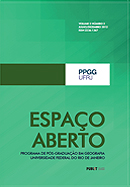Riverine Peasants Resisting Bio-centric Management of Public and Private Conservation Units in the Pantanal Wetlands
DOI:
https://doi.org/10.36403/espacoaberto.2020.38022Keywords:
Socio-environmental conflict, Traditional riverine population, Critical Political Ecology, Environmental Justice, Pantanal wetlandsAbstract
This study analyzes socio-environmental conflict involving the riverine population situated along the state line between Mato Grosso do Sul and Mato Grosso States that is threatened by public and private nature reserves. The nature reserves are articulated in a powerful bio-centric conservation network embracing the Pantanal National Park and private reserves. The objective here is to analyze and evaluate conflict over land ownership rights and restrictions imposed by the conservation units which annul the livelihoods of a legally designated traditional population. Against this threat the riverine peasants mounted a resistance movement and built extra-local alliances with the objective of remaining in place. A theoretical framework based on Radical Environmental History and Critical Political Ecology is used to question environmental injustice concerning policies that discriminate against vulnerable rural populations.



